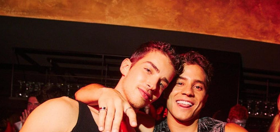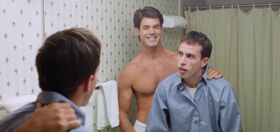
The wait is finally over. Love, Victor–the TV series sequel to Love, Simon–finally arrives June 17 on Hulu.
Brian Tanen is the man in charge. The longtime television scribe cut his teeth penning scribes for Desperate Housewives, Ugly Betty and Devious Maids, among other popular shows. Last year, he made his debut as a series creator with the ABC soap Grand Hotel, which focused on the sordid lives of a family hotel in Miami. Though it only ran one season, the show generated significant attention–including that of Love, Simon screenwriters Isaac Aptaker and Elizabeth Berger, who tapped Tanen to showrun the new series spinoff of the film.
Love, Victor returns to Simon’s Creekwood High, where the new student Victor (Michael Cimino) tries to settle in. He begins a sort of pen-pal relationship with Simon (again played by Nick Robinson) who offers Victor advice about dating, navigating high school friendships, and learning to be himself. Though Victor begins to date his beautiful friend Mia, (Rachel Hilson) he also develops undeniable chemistry with his openly gay friend Benji (George Sear)–which forces Victor to confront some pressing questions about his own sexuality.
We caught up with Tanen to chat about the show, the controversial move from Disney+ to Hulu, and the joys of writing a queer-centric drama about teenagers. Love, Victor comes to Hulu June 17.
How about we take this to the next level?
Our newsletter is like a refreshing cocktail (or mocktail) of LGBTQ+ entertainment and pop culture, served up with a side of eye-candy.
So at what point did you get involved in adapting Love, Simon to TV?
Isaac Aptaker & Elizabeth Berger are the writers of the film, and also the creators of this new series. They brought me on to co-showrun. Prior to that, my only experience with the Love, Simon universe was as a fan. I’d seen the film, and was thrilled to see it out there—a story centered on a gay teen protagonist. The sort of rom-com fantasy you usually see for a straight audience is finally aimed at a gay audience. So I was a fan.
[Isaac & Elizabeth] had this idea in our very first meeting about how they wanted to take the world of the film and turn it into a television show. I thought it was a brilliant concept. It honored the idea that the events of the film had taken place and that those characters were out and about living their lives, and that there was a new generation of students who could connect to the characters from the film but still have their own journey.

What kind of reassurances did you need from Disney—obviously, you’d worked with them before—regarding content? I would remind our readers there was some controversy when the series moved from Disney+ to Hulu.
Everyone at Disney, every executive, was a champion of not only the show but also what it was about. There were a lot of fans—themselves activists of this subject matter. I think Disney+ is a platform finding its brand and its voice. I, for one, feel that for the longevity of the show, that Hulu will allow us to tell more adult stories. We’ll be more able to grow up and have nuanced stories that will include not just first crushes, but also first sexual experiences.
One thing that really surprised me about the show is that it was immediately apparent to me why the show was moved. It’s a much more emotionally complex and mature show than something I would expect from the Disney brand. The film is very fluffy by design. This is much closer to Popular or My So-Called Life. Was that a conscious decision, to go a more challenging, mature route?
I think to the credit of Isaac and Elizabeth, and to the other writers on the show, we fought to make a show that would be the best version of the show. At some point, a decision was made that it belonged on Hulu, but nobody wanted to curtail the authenticity of what we were making. There was never talk of tooling the show to better fit with one network or another. It was really about making the best version of the show.
I don’t think it’s giving too much away to say that Victor has complicated feelings, both for Benji, his gay bestie, and for Mia, whom he actually dates. Did you worry that audiences would see that as a cop-out?
We talked a lot in the writer’s room about that storyline. I think the conclusion we came to was that for a character of that age, this is an authentic story to tell. I think that the story of Simon is a kid who is on the cusp of coming out. He’s just coming into who he is. Our character is a few years younger. He’s at an earlier place in his journey. We felt that the first step of that journey was relatable to a lot of the gay writers in the staff, and was a lot less confident. You’re confused. You’ve been receiving messages your whole life that you ought to be a certain way. It’s very to let go of that idea. We thought it was very authentic to have a girlfriend and try to live, in his mind, the “normal” path. For a lot of us, we also had informative relationships in high school. I had a high school girlfriend who, years later, is still one of my closest friends in the world. And those relationships are meaningful. They are a real form of love. Mia is never meant to be a prop. It’s confusing because his love for her is real, it’s just a different kind of love than the LGBTQ love he will find.

What you say there is so well put. There’s an ambiguity to the title. The series is about love in all forms. Romantic love, love between friends, love between other people, parents, etc. How do you manage all those moving pieces as a showrunner?
That’s a great question. At the top of the season, we all met and came up with an arc for what we wanted these characters to do and the journeys that we wanted to take them on. One of the things I love about writing for TV is you have opportunities to tell stories over a period of time. The journey isn’t over after two hours, it’s over after—if you’re lucky—multiple seasons of episodes. Everyone is going to have to change and grow, which is the way life is. So we knew we wanted stories for all of our characters. We wanted everyone to be grappling with their own problems.
Related: WATCH: The trailer for the ‘Love, Simon’ spinoff ‘Love, Victor’ has us feeling queer & fuzzy
One thing I really identified with is in the trailer. Victor’s mom turns to him and says “I worry so much about the people in this family, but at least I know I don’t have to worry you.” I remember relating to that so much: being a good kid, a straight-A student and being LGBTQ would be a let down to my family. I think a lot of teenagers experience that—the idea they have to hold it together.
Sure.
So we met at the beginning of the season to arc out everybody’s problems. The parental problems—their marriage—were ideas we identified at the beginning of the season and then played out. We had a roadmap.
Let the record show too that you were coming off Grand Hotel, another ABC/Disney show which you created, and which only ran one season, unfortunately.
Yeah.

This is personal, so forgive me, but how does going through something that disappointing affect your confidence, especially when you’re given another big opportunity?
[Grand Hotel] was a really exciting, wonderful experience. I loved the show. When I took the job on Love, Victor I was between seasons on Grand Hotel. I didn’t know if it was coming back; it was a longer hiatus because it was a summer series. Love, Victor, being a 10-episode show, offered me an opportunity to work on another show while I was waiting to see what would happen on Grand Hotel. So while it was a great disappointment that it was not renewed, I had already started work and fallen in love with this other project.
Love, Simon had some major criticisms thrown at it when the movie came out: that it wasn’t a diverse enough cast, that Simon wasn’t feminine enough, that his family is too supportive, that he’s too wealthy, that his relationship was too heteronormative. And that last bit you actually address kind of head-on, which is impressive for a show about teenagers. Was there a conscious effort on your part to make the show more diverse, to confront some of those criticisms?
I think there was a concerted effort to tell a different story than what had been told in the film. So as we explored what an authentic journey would be, all these things you’re describing became part of it. We loved the idea that there are different cultural pressures on LGBTQ teenagers of different backgrounds. The writer’s room was filled with a diverse group of people, Latinx and LGBTQ heavy. I think the fact that we were also a larger group, as a television writer’s room is, that we started to see people’s individual experiences reflected in the show. They became moments our characters experienced.
I’m so curious to know what surprised you…

Well, it wasn’t what I expected. I expected something very cotton candy, very cute, possibly because of the Disney+ association. I expected something sanitized like Hannah Montana or Lizzie Maguire or something. But this is actually a compelling generational drama. Everybody in the show has their own experience. Some are wealthier. Some have different skin tones. And some are older. That creates an interesting dynamic, particularly how that affects Victor’s choices. That, and the idea that you would have a gay couple—teenagers in a high school show—that they would be sitting on a date talking about heteronormativity…I mean, it’s still shocking to me that you could have a gay couple on a high school show at all.
What you’re describing, I think, is a really nice encapsulation of the show. Isaac and Elizabeth are also co-showrunners of This is Us. They love a complicated family drama, as do I. So the nuanced drama of this was always baked into what we wanted the show to be. The other piece you’re talking about, the authenticity of the gay experience, and having them meet head-on some of the more complicated issues of gay life, I think that’s reflected in having an LGBTQ-focused writer’s room.
Wonderful.
And we actually met real LGBTQ teenagers—three separate groups of teenagers at the beginning of our writing process. Our main question was about the importance of this story today. For some of our writers who came out 15, 20 years ago, we wanted to know that it was still relevant. And the answer—especially the further away you got from Los Angeles—was yes. It’s still taboo in parts of the country, and we wanted to reflect that experience.
So do we know about Season 2?
Season 2 isn’t green-lit yet. It’s public that there is a team of writers working on Season 2 scripts.
Sounds promising.
Love, Victor debuts June 17 on Hulu.






















Joshooeerr
Well, the first episode was seriously underwhelming. There comes a point where re-cycling the archetypal coming out story – and Love, Victor is only a minor variation on the hundreds we’ve seen over three decades now – is no longer a positive act of solidarity, and instead a reflection of dated and regressive values. I’d say we’ve pretty much reached that point. The diversity that Love, Victor strives to represent can’t help but undermine the dramatic stakes involved in Victor’s coming out. While there are kids of rednecks or fundamentalist nut jobs who still have serious issues around coming out, the truth is that most kids these days are not faced with much more than an awkward conversation with parents. The fears Victor has (eg about his Latino parents) are largely in his own head; they are clearly going to be accepting. And he’s literally greeted at high school by a vice-principal who gives him a dreamy account of Simon’s romantic coming out (from the film), followed by an encounter with the hottest out-and-proud gay student anyone has ever seen. While Love, Victor is scrambling to be a coming out series for the times, almost everything about the world it creates all but proclaims that “the coming out story is dead”. Maybe they should have listened to their own instincts about being gay in 2020 and made Victor a modern gay kid who actually doesn’t have a problem coming out; perhaps even no real need to. Then Victor and Love, Victor might have been more relevant and more radical than it is.
Cam
Spoiler alert. Don’t read further if you don’t want them.
There is NOTHING challenging about this series that needs an “Adult” network. Other than the fact that Disney didn’t want to have a gay series on it’s main channel. I mean they had the Mandalorian on Disney and people are killed in that show, but apparently a show where a gay kid might kiss someone is just too much.
As for Love Victor. Some was good, but some was LAZY Hollywood writing recycling the same old cliches multiple writers have written before.
1. The 17 year old daughter (Victor’s girlfriend) who acts like a spoiled 5 year old over the very IDEA that her father would date, and is mean and nasty to his girlfriend when she meets her for no reason, including throwing away a very expensive purse the father got her because the girlfriend picked it out. And the father just letting the behavior slide when ANY other parent would have been mortified by her behavior.
2. The sullen teenage daughter (Victor’s sister), a one dimensional character who is only there to act pissed at her parents, and then dramatically overreact to something later on to ruin someones night. This character is a staple, completely underdeveloped, a wasted opportunity, and is boring.
3. The nerdy friend who happens played by a good looking actor cool hair who would not be a nerd in any school., but we’re supposed to believe that nobody would ever even look at the guy.
4. People becoming furious and getting angry with people over things that wouldn’t bother them in real life so the show can have a conflict where none would exist.
Additionally most of the show is about Victor dating a woman, and focusing on whether or not his straight friend and Victor’s girlfriend’s best friend are going to get together. And the straight kids are shown making out 99% of the time, very VERY little LGBT stuff.
This show could have been on during Saturday Morning Cartoons. I don’t mind a coming out story, and there are still a LOT of LGBT kids who will have trouble with it, with their parents, with many things. But it would have been nice if the show had been less about his straight friends hooking up and his girlfriend being snotty to her dad’s very nice new girlfriend and more about the reason people actually wanted to watch a show…because it was supposedly about an LGBTQ kid.
Don’t get me wrong, it’s nice to have LGBT content out there and this was a solid 7.5-8, but if they do a season 2 I will stop watching if the first 2 episodes are all about the sister getting a boyfriend and his nerdy straight friend’s girl troubles.
jasentylar
I loved it. Binged it all in one sitting!! The performances were spot on and the story for every character was well-done. Particularly that trip to New York. I sat there wishing I had that kind of experience as a kid. Can’t wait for season 2!!!